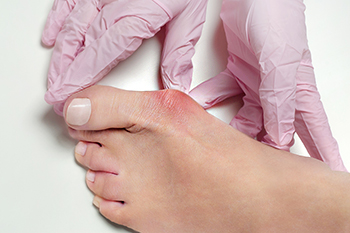

A bunion is easy to notice. The medical term is called hallux valgus, and it is a bulge on the side or base of the big toe. It is considered to be one of the most common types of foot conditions and can be caused by several reasons. These can include genetic factors, wearing shoes that do not have enough room for the toes to move freely, or having an abnormal foot structure. Existing medical conditions such as arthritis may affect the bones in the toes, which may ultimately lead to getting a bunion. If the bunion is severe, it may cause the other toes to shift toward each other, and calluses and corns may form on top of the toes. A bunion is considered to be a deformity, and relief may come from wearing shoes that fit correctly. Additionally, some people choose to wear a protective pad over the bunion. If you have developed this condition, please contact a podiatrist who may offer surgery as a solution for permanent removal.
If you are suffering from bunions, contact Dr. Stephan J. LaPointe of Georgia Foot & Ankle Specialists . Our doctor can provide the care you need to keep you pain-free and on your feet.
What Is a Bunion?
A bunion is formed of swollen tissue or an enlargement of boney growth, usually located at the base joint of the toe that connects to the foot. The swelling occurs due to the bones in the big toe shifting inward, which impacts the other toes of the foot. This causes the area around the base of the big toe to become inflamed and painful.
Why Do Bunions Form?
Genetics – Susceptibility to bunions are often hereditary
Stress on the feet – Poorly fitted and uncomfortable footwear that places stress on feet, such as heels, can worsen existing bunions
How Are Bunions Diagnosed?
Doctors often perform two tests – blood tests and x-rays – when trying to diagnose bunions, especially in the early stages of development. Blood tests help determine if the foot pain is being caused by something else, such as arthritis, while x-rays provide a clear picture of your bone structure to your doctor.
How Are Bunions Treated?
If you have any questions, please feel free to contact our office located in Rome, GA . We offer the newest diagnostic and treatment technologies for all your foot care needs.